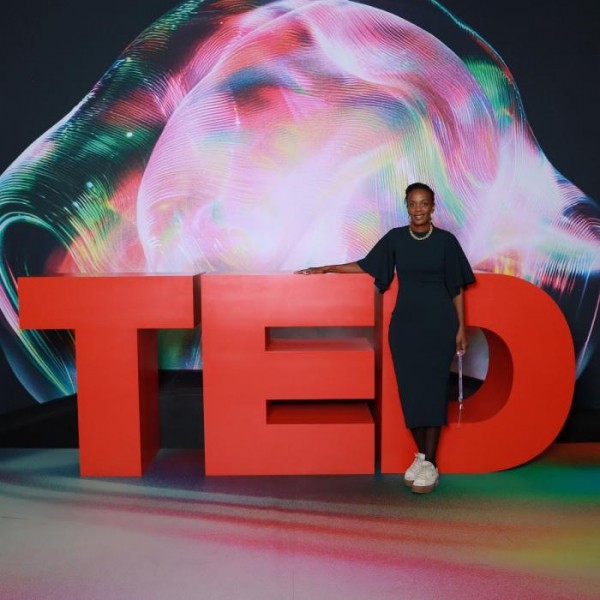GEOG Assistant Professor Named 2025 Bellagio Center Resident, TED Fellow
Catherine Nakalembe plans to focus her residency and fellowship on building a premier institute in Africa that uses Earth data and technology to advance sustainability in the region
Catherine Nakalembe, an assistant professor in the Department of Geographical Sciences, was recognized for her changemaking ways twice this spring: by being selected to be a part of the 2025 class of The Bellagio Center Residency Program, and as a member of the 2025 cohort of TED Fellows.
The Bellagio Center Residency Program, a monthlong residency program that offers participants the time and space to work in The Rockefeller Foundation's Bellagio Center in Italy, has hosted thousands of movers and shakers—including Ruth Bader Ginsberg, Maya Angelou, and Department of Psychology Distinguished University Professor Arie Kruglanski—from countries all over the world. Nakalembe’s class—which joins over 4,100 individuals from more than 130 countries—includes 105 global leaders from 33 countries, all of whom are advancing projects that reflect The Rockefeller Foundation’s mission to “promote the well-being of humanity.”
“Having this kind of recognition—that I have big ideas and maybe those ideas should go further because I have the vision—that’s what I think the residency represents. It’s an honor,” said Nakalembe.
During her time at the Bellagio Center, Nakalembe hopes to further develop her vision for an Africa-based institute that would serve as a hub for innovation and collaboration in Earth Observations and artificial intelligence. This institute would accelerate global and regional partnerships, prioritize local participation in knowledge creation, and provide opportunities for African scientists and institutions to collaborate with leading global experts.
By creating a space to develop cutting-edge technical skills, the institute would enable the creation, adaptation, and scaling of sophisticated monitoring systems and analytical tools that have been built over years of research. Through strengthened collaboration networks, partners could work together to implement these methods in various contexts, ensuring that technologies for weather events, crop failure, food supply challenges, and other applications can be effectively deployed to support life-saving decision-making across diverse regions on the continent.
“Capacity needs to be local,” Nakalembe said. “When I was in Madagascar, there was a cyclone warning—there was data on the direction, the wind speed, how long it would last—but no local alert system. There wasn’t a single siren. So even though we’re building all these tools and methods, when it comes to real impact, it’s the people on the ground who need to have that capacity and deploy the warnings in the most contextually relevant way.”
The Institute would be the latest way in which Nakalembe—the Africa Program Director of NASA Harvest, a multidisciplinary program commissioned by NASA and led by the University of Maryland to enhance the use of satellite data in decision-making related to food supply and agriculture across the nation and the world—seeks to build capacity for monitoring agriculture and reducing disaster risk in Africa.
She is thinking of naming the institute “The Xylem Institute,” which is in line with her similarly named Xylem Lab.
“Xylem are specialized cells that transport water and essential nutrients throughout the plant. I named my lab Xylem because it captures the metaphor of invisible yet vital pathways that nourish growth; we don't see the individual cells, but we witness the thriving tree. This reflects our mission perfectly," Nakalembe explained. "While developing methods and technology is central to our work, what truly creates impact is building human capacity. When individuals gain the skills to utilize these technologies independently, that's when transformation happens, just like how xylem silently enables a tree to flourish.”
Being able to effectively communicate her ideas for The Xylem Institute is something Nakalembe hopes to take away from her TED Fellowship, which is designed to offer communication training, network-building opportunities and amplification for remarkable individuals who are pushing boundaries in their fields and tackling the world’s greatest challenges.
“My TED fellowship video will reach a very large audience, but the fellowship isn’t just about that,” she said. “It’s about joining a whole network—and then, for the rest of your life, you’re part of it. Fellows become senior fellows and support each other. That’s a big deal.”
Nakalembe was one of 10 people selected for the 2025 Class of TED Fellows, whose alumni list includes more than 500 global changemakers in over 100 countries.
“I’ve given so many talks at very, very high-level events, but I’ve never really been mentored to prepare for them. So, this is uncharted waters, but I see a lot of value in it,” Nakalembe said. “I aspire to reach broader organizational audiences who might recognize the untapped potential in the communities I serve. Meaningful, far-reaching influence is what I'm dedicated to creating.”
Photo provided by Catherine Nakalembe, courtesy of TED
This article was originally published on the College of Behavioral & Social Sciences website.
Published on Thu, 04/17/2025 - 11:45


